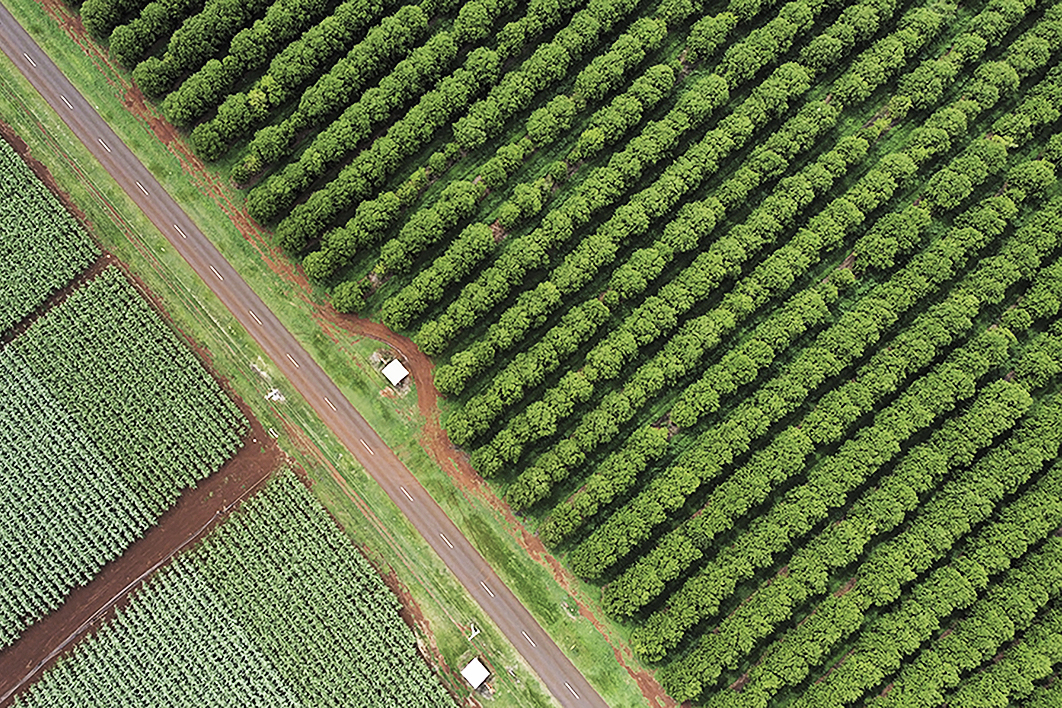Seen from the top of a small, extinct volcano known as the Hummock, the countryside east of Bundaberg is a fertile patchwork of green fields and freshly tilled red-brown earth. Extending inland, this is perhaps Australia’s richest food bowl, pre-eminent in avocados, macadamia nuts, passionfruit, sweet potatoes and sugar cane, says the chief executive of Bundaberg Fruit and Vegetable Growers, Bree Grima. That’s the sugar cane used to make the rum that bears the town’s name.
But there is a dark side to the region’s history, of course. The fields were cleared of volcanic rocks in the late colonial years by some of the 62,000 Pacific islanders brought here and to other sugar towns by the infamous “blackbirders.” Most of the forced labourers came from islands in what are now Vanuatu and the Solomons.
Behind the little wooden church that serves Bundaberg’s remaining descendants of those islanders is a memorial engraved with hundreds of names, mostly of young men from islands like Tanna and Malaita, who died more than a century ago of overwork and illness. The deaths were registered at the time, but the graves were outside the town cemetery and unmarked. The dry stone walls these “Kanakas” built from the rocks, and probably many of the graves, are now being cleared for more extensive farming.
The history still echoes. On land near the Hummock I saw the orange high-vis vests of workers planting sweet potato seedlings in a vast field. Three days later this work gang from Tonga was over near the road, their work almost completed at a Stakhanovite pace.
Talk to Pacific islander seasonal workers like these, and to the young foreign working holiday-makers in the area’s hostels, and you often hear the term “modern-day slavery.” Accounts abound of picking, planting and pruning paid at piece rates rather than the per-hour rates specified by the industry award, and of wages clawed back by excessive charges for poor-quality housing and other levies.
Bundaberg is not an isolated case, or even the worst. The same stories are heard in many other horticultural regions around Australia. The industry relies on a vulnerable, largely non-unionised pool of casual workers, some of them islanders brought here from nine neighbouring countries under the federal government’s Seasonal Worker Programme, a lot more of them foreign backpackers needing their eighty-eight days of farm work to renew their visas for a second year (or six months for a third year).
In a third category of exploitable labour are the mostly Asian workers variously called “overstayers” and “undocumented” who come into Australia on visitor visas and then either apply for refugee status — a process that can take three years while they go out and work — or go off the radar. An estimated 70,000 of them are working in rural Australia. Some were visible in a strawberry field I passed near Childers, a town inland from Bundaberg, and they moved nervously behind a line of trees when they noticed Geoff Smith and me looking at them.
“What’s the difference between 160 years ago and now?” says Smith, a retired construction worker and union delegate. With his wife Jane, granddaughter of a cane worker kidnapped as a boy from Tanna island in what is now Vanuatu, he provides pro bono pastoral care and advocacy for the many workers from Vanuatu among Bundaberg’s seasonal labour force.
Smith answers his own question: “It’s the aeroplane, rather than the schooner.” That’s an exaggeration, of course, but with a kernel of truth.
According to Abul Rizvi, a former deputy secretary in the immigration department, exploitation of foreign workers has been on the rise in Australia. That has happened despite federal parliament’s passing the Modern Slavery Act in 2018, which requires employers with turnover of $100 million or more to report any such slavery in their supply chains.
“The issue is not just confined to undocumented workers but extends to migrant workers brought to Australia under a range of visas,” Rizvi writes in a book he’s finalising for publication. “Over the last six years, there has been a major increase in the misuse of visitor visas and the asylum system to bring in migrant workers, effectively as indentured labour.” Employers and labour hire companies are unlikely to be caught, he adds, and the penalties are comparatively minor. “The rewards from exploitation of migrant workers are substantial; the risks are small.”
But the Covid-19 pandemic has disrupted this modern system of exploitation. With the numbers of foreign backpackers in the country down to about 50,000 from the usual 140,000, and with seasonal workers reduced to about 7000 from the pre-Covid 12,000, Bundaberg is sharing in a nationwide shortage of farm labour. At least temporarily, bargaining power has been reversed.
“There’s not enough workers to go round,” says a Bundaberg grower I’ll call Dudley. (He asked that his real name not be used.) “Once all this bullshit’s over and all the backpackers come back, the boot’ll be on the other foot. Now the boot’s on their foot, kicking our arses.”
Anecdotal evidence points to a lift in wages. “I had a bloke ring me the other day, and he’s whingeing that some other prick’s paying his workers a couple of dollars a bucket more than what he is,” Dudley tells me. “I said, mate, I was telling you this was going to happen.” A labour recruiter in Bundaberg tells of a sweet potato grower offering a bonus of $2 on top of the $24.90 hourly award rate, to be paid retrospectively if the worker stays at least five weeks.
The same recruiter says some growers are even willing to consider hiring local Australian workers. He has placed a few, including some with disabilities. Bundaberg has one of the highest unemployment rates in the country, 11 per cent in the December quarter, but the recruiter says it’s hard to induce young people off the steady, if low, lifeline of JobSeeker for work that has a reputation of being short-term and brutally demanding.
“They have been shut out from the unskilled labour force and are now entrenched in the Centrelink system,” says the recruiter. “Some are only interested in putting down that they applied for our jobs, and 50 per cent don’t turn up if they are given positions. But it’s getting better, and we are committed to the 50 per cent who do turn up.”
The growers’ association’s Bree Grima says farmers increasingly rely on local workers. But the federal government’s offer of $6000 relocation assistance has not helped much in bringing in workers from elsewhere in Australia, she says, with only a 0.3 per cent vacancy rate in Bundaberg’s rental housing.
The labour shortage has allowed workers to bargain down charges in backpacker hostels, which are often tied to labour hire companies, or move to independent accommodation in motels. They can also pick the more congenial work — picking avocados, macadamias and passionfruit, for instance, rather than collecting sweet potatoes or watermelons in vast unshaded fields.
“I’m up on my cherry picker among the avocado trees,” says one British backpacker taking a break from his finance sector job back home. “I don’t have to talk to anyone and I can smoke weed all day.”
The islanders face more uncertainty. They’re here under the Seasonal Worker Programme, administered by the Department of Education, Skills and Employment, or DESE, or are among the 2500 or so unskilled and semiskilled workers in the parallel Pacific Labour Scheme, run by the Department of Foreign Affairs and Trade, which targets a wider range of industries.
Coming from Vanuatu, Fiji, Tonga, Samoa, Solomon Islands, Kiribati, Papua New Guinea, Nauru, Tuvalu and Timor-Leste, they are normally tied to one employer — the seasonal workers for up to two consecutive six-month periods, the Pacific labour staff for one to three years. With the Covid crisis, workers have been allowed to stay in Australia after their visas expire. They are free to change jobs as they wish, though some seem unaware of this rule and others fear being dubbed absconders or unsatisfactory workers — and sent home — if they complain or seek a new job.
Two workers from Vanuatu I meet have worked around the Queensland towns of Emerald, Maryborough, Childers and Bundaberg, picking grapes, oranges and mandarins, watermelons and avocados. They’ve paid up to $230 a week for accommodation, sometimes for bunk space so tight they couldn’t sit up.
They mention “ethical” employers, naming one big avocado grower, and others who don’t fit that description. “One never explained the piece rate,” says one of them. “He changed it so it equalled the hourly rate for the fastest worker. The rest got lower. You didn’t have a choice.”
Both now have work with a grower who hopes to keep them long-term, one earning about $1500 a week on piece rates, the other around $1000 a week on the hourly award rate. They worry about illness, and whether the insurance the employer says it has taken out will actually cover them. “It would be better if we had proper healthcare like the Australians have,” one says. “We work here the same way, and pay tax — why not?”
According to ANU Pacific affairs experts Richard Curtain and Stephen Howes, some 48 per cent of seasonal workers are employed by four labour hire companies, and the rest by smaller labour recruiters or approved growers. The reliance on intermediaries creates a gulf between the islanders and farmers that contrasts with the goals of New Zealand’s longer-running Recognised Seasonal Employer scheme, which makes a greater effort to incorporate pastoral care for visiting workers.
Under the NZ scheme, island workers return repeatedly to the same farms and vineyards, and in some cases employers visit them in their home villages in the off-season. The aim is to build a group of workers “who keep coming back,” says Jill Biddington, an organiser with Union Aid Abroad–APHEDA in Sydney, who monitors Pacific island workers in Australia. “Australia just wants cheap labour. I’ve never seen an Australian farmer over there.”
In many cases, labour hire companies in rural Australia work closely with hostel owners, or operate hostels themselves. Until the pandemic, in fact, the hostels were the only channels for employment. Seasonal worker papers or a foreign passport were prerequisites and, says Geoff Smith, “locals didn’t get a look-in.”
One such hostel in an inland town is essentially a collection of temporary cabins, with gas burners in semi-enclosed spaces for cooking and a central block of toilets and showers. It was raining when I visited, and a group of backpackers sat out unpaid downtime looking at their computers and phones. One young woman pointed to a square camping tent for which she was charged $110 a week. Down the hill, two young men from Vanuatu pointed to a long corrugated iron shed where they live four to a room.
At my motel in Bundaberg, Aurora Garcia, a Spanish-Canadian backpacker, tells me she had paid $215 a week for a bunk bed at the inland hostel for several months early last year. The rooms were stifling hot in summer and frigidly cold in winter. The flammable walls meant that heaters weren’t allowed. The washroom was an open walk away, with three toilet cubicles and three showers for forty or fifty women, and the same ratio for men. When everyone returned from work late in the afternoon, the shower queue stretched across the compound. Then, eight people per gas burner, they tried to cook dinner.
“When I went down the hill to talk with one of the Vanuatu guys I met out picking, the manager came and ordered me back, and threatened to kick me out,” says Garcia. “It was like racial segregation: white backpackers up here, islanders down there, and no mixing allowed.”
She worked next at an avocado farm whose product was recently featured by a major national supermarket chain. There, she says, the supervisor exercised discipline fit for a military drill squad, ordering pickers who fell behind to do star jumps and push-ups as punishment.
Until February this year, a converted pub in Bundaberg housed nearly one hundred seasonal workers and backpackers, each paying $200 a week for a bunk bed, with up to twelve to a room. Some had been brought there when the owners, operating as an unauthorised recruiter, drove a bus out to Childers and recruited seasonal workers with the promise of better pay. According to Smith, they were delivered to growers nearer town and told that, as “absconders,” they were at risk of deportation if they complained.
Then, in February, the owners told the workers to move out, for reasons that are not clear. The move roughly coincided with a visit by Vanuatu’s high commissioner, Samson Vilvil Fare, who was told the exodus was to allow for renovations. When I went into the hotel to enquire, I was met by a young man who, in a menacing manner, ordered me to leave.
Vilvil Fare didn’t consider that the hostels he saw in Childers and Bundaberg met the standards he would expect from a “first world” country. “When I’m visiting those areas I am having lots of questions raised — I’m also dumbfounded, I’m shocked, I’m worried,” he tells me. Media reports about the conditions seem to have had no impact, and nor has academic fieldwork. “Since I’ve been here I haven’t seen much change when it comes to welfare for our people.”
Backpackers don’t usually have to endure these conditions for more than a few months; they aren’t generally saving money for their families; and they often have parental credit cards to fall back on. But Pacific islanders are much more culturally adrift and financially constrained.
Many don’t have the command of English needed to understand contracts, payslips, superannuation deductions, bank accounts, medical insurance, tax return requirements or avenues for complaints. Geoff Smith has to check they’ve cut off recurring subscriptions for phones, streaming services and so on before they leave, so that refunds of tax and super are not eaten up when they are eventually paid. Employers don’t explain how costs like airfares can be recovered. Young workers from the Polynesian islands in particular can have unrealistic expectations of how much money they’ll be able to send back for church projects as well as their own families.
Gouging is rife. The Bundaberg recruiter tells me of workers being charged $400 each for transport from work on the Sunshine Coast to a new workplace in Bundaberg. (A train fare is around $35.) “The contractors rip them off,” says Dudley, the grower. “Then the farmer gets the bad name for not paying the worker properly.” He now refuses to use labour hire companies, hiring individual staff himself.
The inclusion of female workers in the schemes has added the new problem of sexual coercion and assault. Geoff Smith says he’s been told of several cases where male islander team leaders tell women in their work gang, “You are my woman while we are here.” Smith says the problem is largely ignored. “The women don’t want to make a fuss. They have a fear of being sent home.”
Islanders unused to driving conditions in Australia are sometimes expected to drive work vehicles, or buy old cars to get to their workplaces, despite having experienced only the slow and sparse traffic back home. So far, says DESE, twenty-five seasonal workers have died in Australia since its scheme started in 2012, mostly as a result of car accidents or “pre-existing” illnesses. No one I met can remember any inquests. “Twenty-five is just extraordinary for such a small visa,” says Abul Rizvi.
Both of the federal departments administering the labour schemes are reluctant to comment on how they exercise pastoral care and enforce regulations. DESE says it is in the process of appointing “up to nineteen” “mobility officers” to carry out these roles, but it seems they will be located in state capitals. Last October the department announced that $9 million would be spent on seasonal worker welfare, and this April it gave $1 million to the Salvation Army for pastoral care.
Geoff Smith says he has only seen DESE officials when Vanuatu’s high commissioner came to look around Childers and Bundaberg, and after Bundaberg’s Federal hostel burnt down in July last year (without loss of life). Jill Biddington says she has never seen any DESE officers in the field and suspects most are satisfied with photos sent by hostel operators. “No one is enforcing standards,” she says. “It’s all self-regulation, tick-a-box stuff.”
The Fair Work Ombudsman’s office says it pays special attention to complaints by the vulnerable migrant workers, and has an agreement with the Department of Home Affairs that they won’t be subject to visa action for complaining. In 2019–20, it says, 44 per cent of matters it took to court involved visa-holder workers. The total amount recovered for these foreign workers was $1.7 million, while the ombudsman also won nearly $3 million in court-awarded penalties. Only 12 per cent of the cases the ombudsman acted on were in agriculture, forestry and fishing. Rizvi’s observations about the odds of getting caught and penalised, or even exposed, seem to hold.
The Department of Foreign Affairs and Trade set up a Pacific Labour Facility to administer its Pacific Labour Scheme in October 2018. At some point the facility was outsourced to the international private aid-management company Palladium. Its office in Brisbane refers media queries to the department. Former foreign minister Julie Bishop, who supervised the disbanding of the widely admired AusAID agency within her portfolio and a huge reduction in Australia’s foreign aid program, joined Palladium’s board soon after she left politics in 2019.
Amid widespread criticism that the Pacific and backpacker schemes lack proper supervision at ground level, calls are being made for responsibility to be shifted. Union Aid Abroad–APHEDA’s Biddington suggests the Seasonal Worker Programme be shifted from DESE to Foreign Affairs. “DESE just fails to have the sensitivity needed for working with people from different cultures,” she tells me.
No one is suggesting that the two Pacific island worker schemes should be scrapped. When they work well, they allow villagers from nine Pacific nations to learn new skills and work practices, and to save up several thousand dollars to invest in small businesses, cyclone-proof housing or higher education for their children. While much official aid gets consumed by urban political elites or recycled back to Australia, the two schemes direct money from Australia to productive, grassroots use. They also build people-to-people contacts between Australia and its inner ring of neighbours.
But the behaviour of some labour hire companies and farmers risks tainting some Australian products — meat, fruit, vegetables and wine — with the modern slavery label, and denying them certification as ethically sourced. This would be a propaganda gift to countries smarting under criticism for their own forced labour. China and Xinjiang leap to mind. Trade sanctions could follow.
With the federal government now predicting international travel will not open up until mid 2022, regions like Bundaberg face another year of labour shortage. Rather than waiting and hoping for the old conditions to return, Australia could seize the opportunity for structural change in the regional labour supply, and implement measures to disperse backpackers around a wider range of sectors, increase opportunities for workers from the Pacific, and get Australians into the farm work from which they have been effectively excluded. •
Funding for this article from the Copyright Agency Limited’s Cultural Fund is gratefully acknowledged.





